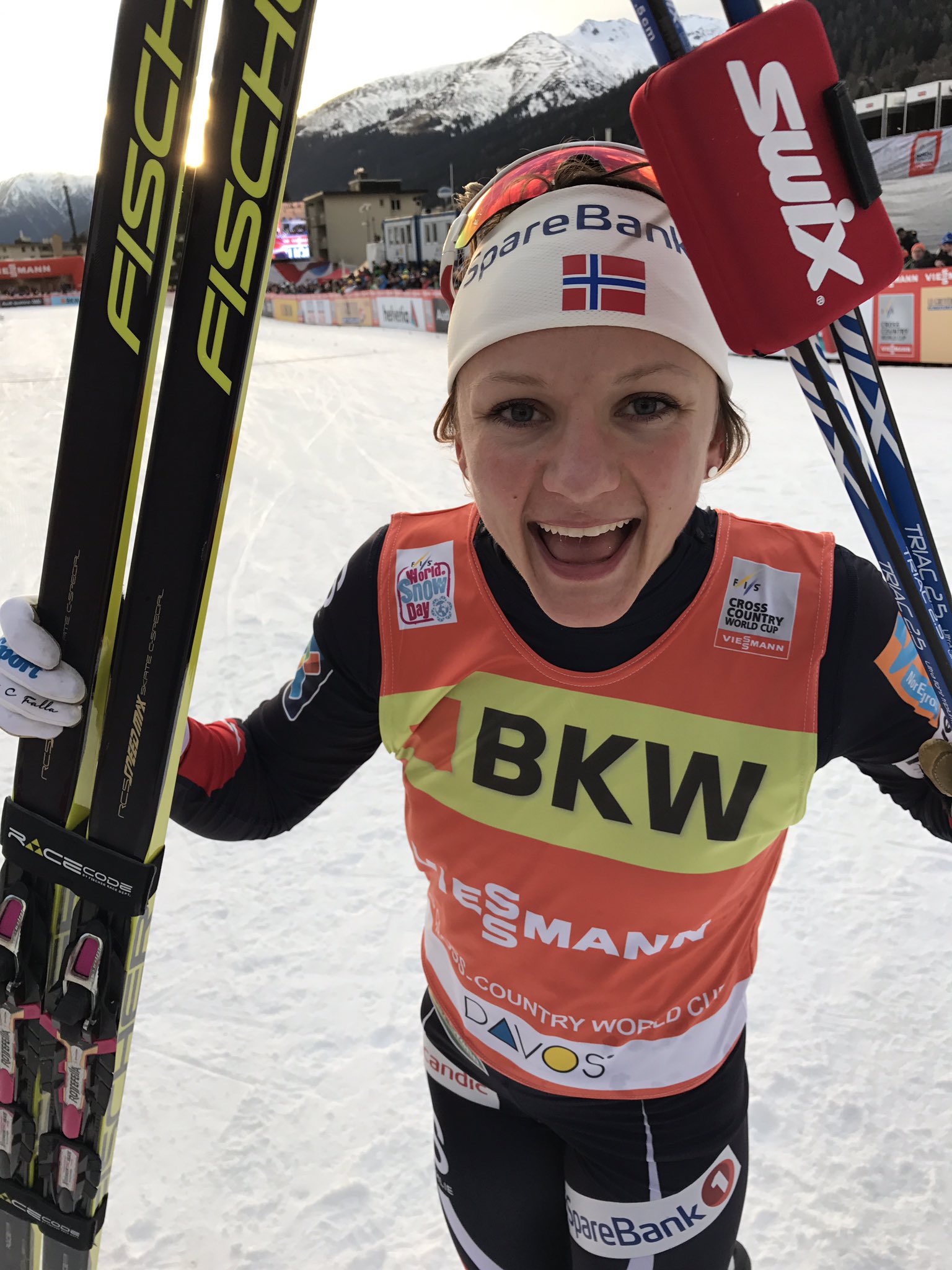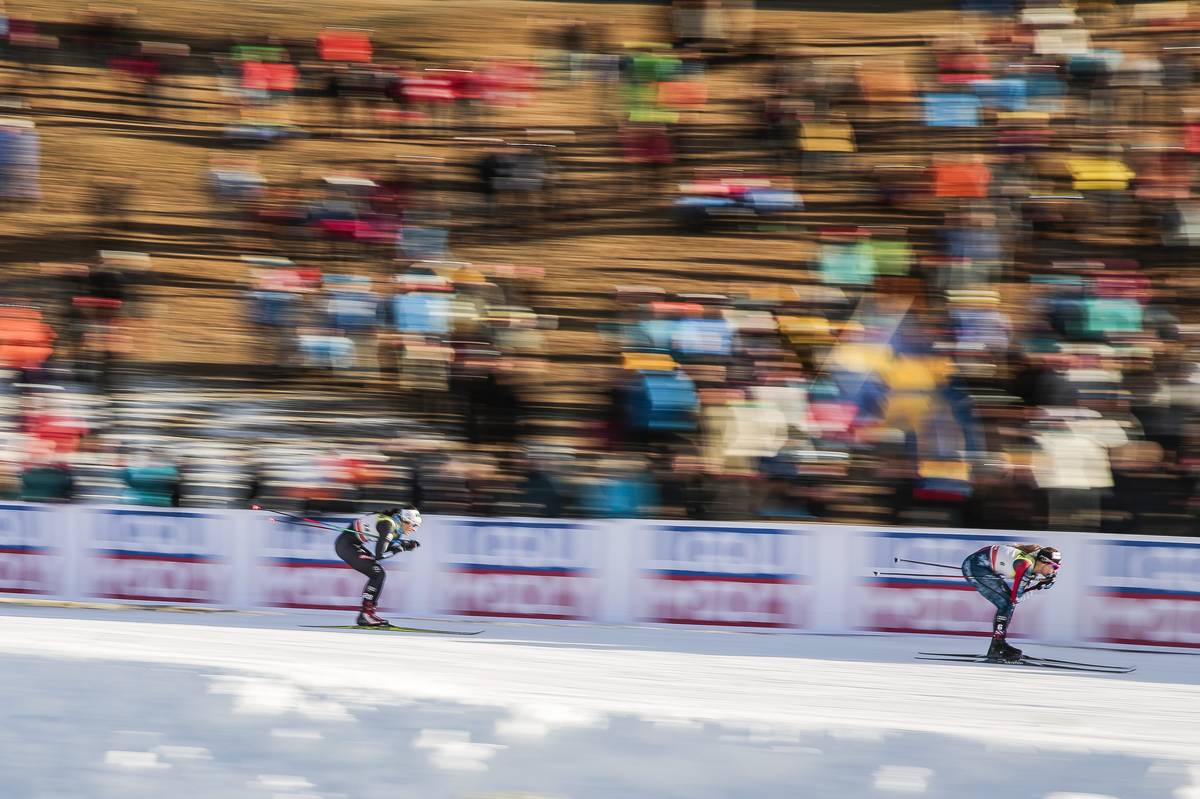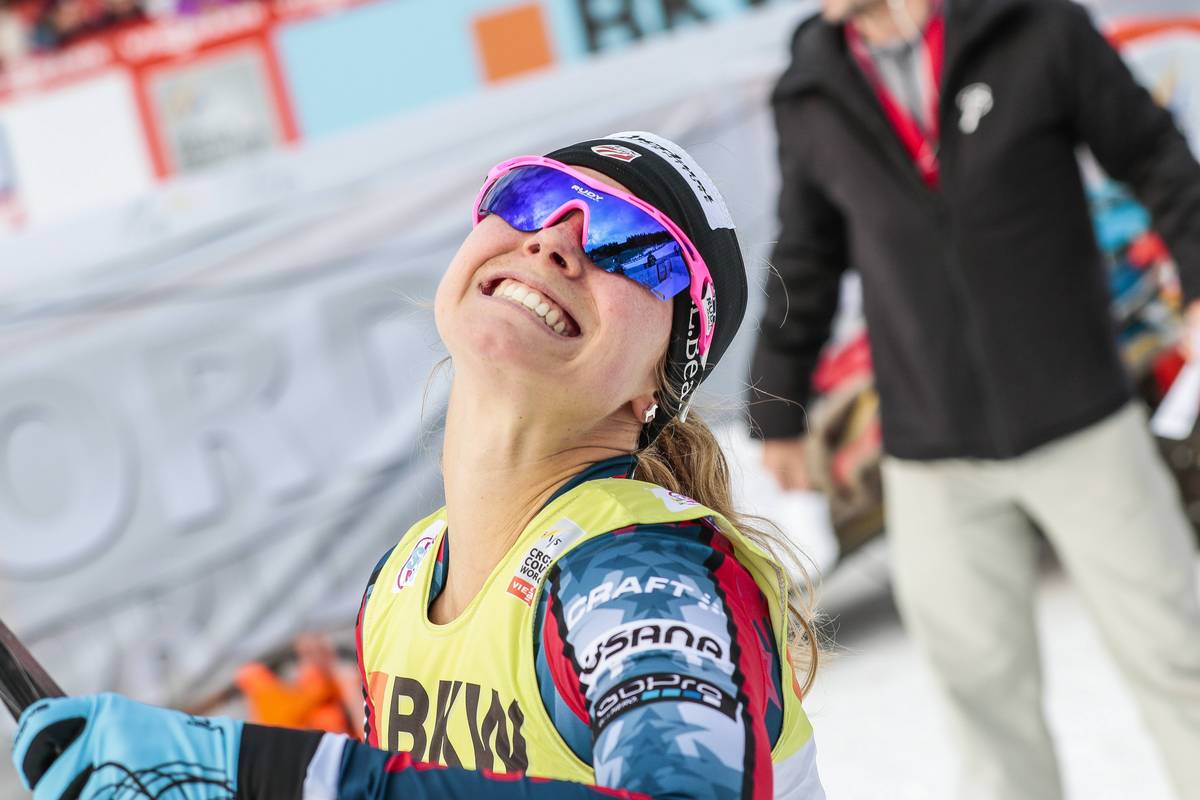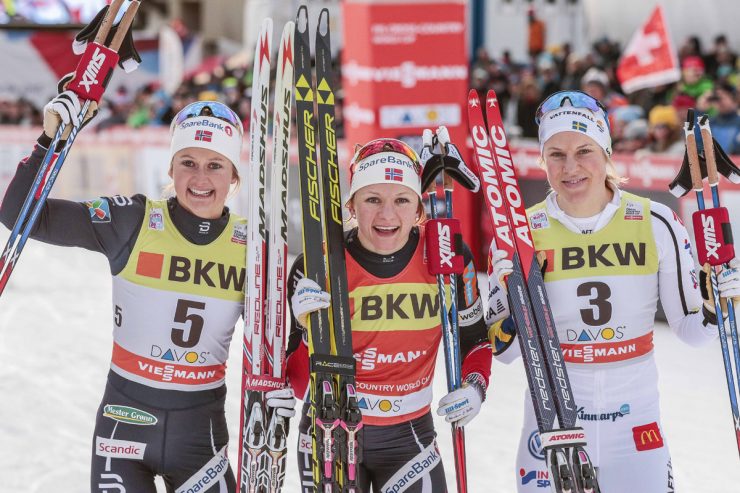
DAVOS, Switzerland—After winning the first 15 k World Cup of her career on Saturday, Norway’s Ingvild Flugstad Østberg – long considered a sprint specialist – noted that maybe it was sprinting she actually needed to work on.
One day later, there’s no doubt that she’s still got it. Østberg finished second behind teammate Maiken Caspersen Falla in the freestyle sprint, and took the overall World Cup lead from another teammate, Heidi Weng.
“I will sleep with this for a week, and then maybe Heidi will take it away from me,” she joked.
But whether she had her sprint chops back or not, she couldn’t touch Falla.
Falla was strong all day, starting by qualifying in second place, and proved unstoppable in the final. She skied hard immediately out of the start and by the second lap of the two-lap course, two skiers – Jessie Diggins of the United States and Natalia Matveeva of Russia – had already been dropped.
“I felt very good today,” Falla told FIS of the form that allowed her to shatter the field. “I felt my shape was good and I was able to keep the right technique.”
It was just Sweden’s Hanna Falk and Jonna Sundling holding on, and Østberg. Østberg came closest to tailing Falla, but when Falla attacked on the last uphill it was too much. Falla opened a large gap which nobody could close, and ended up winning the final by 0.53 seconds.

“The hill here in Davos fits me and I was confident I could make my move on the top, but I was stiff on the way down and in the curve,” Falla – who had been on the podium in the Davos sprint three times before but had never won – told FIS.
Her move certainly impressed her competitors.
“She was really strong,” Østberg said. “She deserved to win. For sure I wished that I could follow her, but I wasn’t strong enough.”
The win means Falla will keep the Sprint Cup leader’s bib, a competition which she leads over Østberg.
Østerg barely locked up second, as Falk surged in the final hundred meters and nearly skied past the Norwegian, finishing just 0.07 seconds back. The come-from-behind sprint had allowed her to pass Østberg in her semifinal, giving her one of the automatic spots in the final whereas Østberg had to rely on lucky loser status.
But Falk couldn’t quite get to second place again in the final.
“It was close, but my last corner was a little bit tricky,” she said. “I was a little bit too much right. I think my finish is very good, but here in the finish it is not so long, so you have to really be in the front.”
Maybe it was because Østberg was feeling better and better: “In the beginning of the day, I felt like it was something strange, I felt kind of slow,” she said. “Still I had a really good qualification, so from that I was a little bit surprised. But then I felt stronger in every heat. So maybe I need two more heats and then I could be the winner.”
Fourth place went to Sundling, a 21-year-old who won the qualifying round over Falla.
“[My strategy] was just to ski as fast as I can, follow the others, and see how far I could come,” said the happy Swede. “The shape was good, the skiing was good, everything was good… It was very tight in the final, in front of the finish line. So it’s not so far up to the best ones. I don’t really know what to do to get there, but, but just ski. Like I do.”
Diggins Fifth As Americans Beat Quarterfinal Curse

Diggins only made it into the final as a lucky loser, and had been feeling tired all day. Before the final she tried to rally her energy one more time. She ramped up her energy out of the start and put herself in fourth position on the first trip up the loop’s hill.
“The first half I was thinking, I’ve got it, I’ve got it,” Diggins said.
But on the long straightaway beginning the second lap, Falla upped the pace and Diggins and Matveeva began to fall behind. This felt something more like, “noooooo,” Diggins said.
By the top of the hill Diggins was in sixth behind Matveeva. But on the last downhill corner, her competitive instincts kicked back in with a vengeance.
“Matveeva started pushing me on the last corner and I thought, uh-uh, nope, nobody’s going to out-corner me on this,” Diggins said. “Downhills are my thing.”
She surged past Matveeva in the finishing straight and picked up fifth place, her second top-five in as many days after finishing fourth in Saturday’s 15 k.
“Coming off the 15 k yesterday, I was so wiped,” Diggins admitted. “I was trying to do some self delusion, ‘I feel great, I feel fine,’ talking myself into it. But once I got going today it was okay. I was in the final with other girls who skied yesterday too, so there’s no excuses, just go for it. And it was fun to be in the final– it has been a while.”
“By her semi-final, you could see fatigue from the previous day,” U.S. Ski Team Head Coach Chris Grover agreed. “But at the same time she knew that she was in there with Østberg who had raced the day before as well. So anything was possible at that point. So she just went out there in the final and wanted to see where she could stack up in the end.”
With two knock-down, drag-out efforts in a row, Diggins is looking for some recovery before the World Cup moves to La Clusaz, France, next weekend.
“At this altitude, it is really hard to dig yourself out of a hole, so I don’t want to put myself into one,” she said. “I might use the sauna in the Kulm tonight, who knows. The training load up until now has been really good, but I want to make sure– the relay to me is everything. So I want to rest up for that for sure.”
Caldwell in Semifinals; Sargent, Bjornsen, and Beatty Make Quarters
Fellow U.S. skier Sophie Caldwell very nearly joined Diggins in the final, skiing in a solid second place position coming into the final corner of her semifinal. But then Caldwell crashed and was left trailing across the finish line a distant sixth in her heat.
“It’s funny: I don’t fall too often sprinting, but I’ve fallen twice here in the semifinals,” Caldwell said of Davos. “One I think was two or three years ago, when Kikkan and I both fell in the same semifinal. And today. I don’t even know what happened. I tried to slide it, but the ski slipped out. It’s a bummer because I was feeling good, and I had gotten myself into a good position, but that’s racing.”
She had worked herself up from fifth place at the beginning of her semifinal through a series of decisive moves.
“I didn’t have a great start, but I don’t love leading, especially on a course like this at altitude,” Caldwell said. “It is just a lot easier for me to follow. So even though I was in fifth in the beginning, I just tried not to panic and sort of picking people off. The hill isn’t generally my strength, but I feel like I was skiing it a lot better in the heats than I did in the qualifier. So I just tried to leave some open space for myself and try to move around to get into a good position.”
Caldwell ended the day 11th and called it “a step in the right direction” after she didn’t move out of the quarterfinals in either of the previous World Cup sprints this season. With Sadie Bjornsen finishing 15th and Ida Sargent 20th, Grover also saw it as an improvement for the whole team.
“Today was obviously a step forward,” Grover said. “Without the crash by Sophie we would have had two women in the final. So that was a huge step forward because we hadn’t made it out of the quarterfinals yet on the World Cup. And we also had Sadie who was close to going through. It’s always hard for us to remember, but we knew that we wouldn’t be super sharp through the beginning of this period. Every week is a little bit better, as expected.”
Bjornsen finished third in her heat behind Caldwell and also felt that her race shape was mocing in the right direction.
“It was better than it was the past couple weekends,” Bjornsen agreed. “I was fighting out there with one of the girls-I should have taken that last corner with less sliding and actually skiing it. But there were good things out there too.”
Like Diggins, Bjornsen is trying to avoid falling into a hole energy-wise. So she opted not to compete in the 15 k on Saturday.
“It’s really hard to skip races,” she said. “But you never know you’re tired until you’re already tired, and coming back from being already tired is sometimes challenging for me. I always look at the first period of racing and try to be in the best form I can. Normally during period one that means skipping a distance race here, despite it being very, very hard to do so. I think this course would’ve been so fun for me, but maybe next year I will feel stronger and more ready to do everything.”
Despite only narrowly missing the semifinals, Bjornsen was able to find things to be happy with in her race.
“I felt very strong in all the working sections, which is nice,” she said.
As for Sargent, she had some quick reflexes to avoid a crash which took out Jennie Oeberg of Sweden and Laurien Van Der Graaf of Switzerland halfway through the heat. That left Sargent in second place behind Falla, who she followed for a few hundred meters.
“I tried to keep it controlled but and I just maintained space,” Sargent said. “I think I paced it well and was able to push over the top. The altitude is kind of funny. In the past I have really blown up here. So my goal was to not do that.”
She was in second place coming around the final corner, but Ilaria Debertolis of Italy and Evgenia Shapovalova of Russia were able to use their momentum and finishing sprints to beat her to the line.
“That is my biggest weakness,” Sargent said of sprinting out skate heats. “It’s something I am still working on. I get pretty frantic as I close in on the final line, so I have been working on that a lot in training. On keeping it controlled and not just going crazy tempo. I wasn’t able to actually pull that together today, but it’s good to know that besides those last 100 meters, the first 95% of the course is good.”
Grover agreed, and said that Sargent’s skate sprint could definitely come around.
“Definitely she just needs more time to smoothen stuff out,” Grover said. “She’s just losing a little bit of contact with the snow in her push, a little bit too jumpy, a little bit too hoppy, not so long and steady with the push. It’s a small adjustment we can hopefully make with her.”
American Caitlin Patterson ended the day 47th, Kikkan Randall 58th, and Liz Stephen 61st.
“I start a sprint whenever there’s a free spot,” distance ace Stephen said. “It’s kind of fun to do a race with no pressure and no nerves.”
Beatty Breaks Through for Canada
For Canada, Dahria Beatty qualified for World Cup quarterfinals for just the second time in her career, and the first time in Europe. She ended the day in 25th.
“The first lap was good,” she said. “I started out at the back and was trying to stay in the pack. One of the girls just in front of me broke a pole, so I had to work a little harder to get around her. On the second lap it kind of just paid its price, and I wasn’t quite able to keep up with the pace and started falling apart a bit.”
The top four women gapped Beatty, who finished the heat in fifth, 5.12 seconds behind Østberg, who was beginning her fight for the podium.
“It was my first skate heats in the World Cup, and my first World Cup heats in Europe so it’s a really good learning experience,” Beatty said. “Hopefully next time will just have a little more energy for the heats. But the qualifier was really good for me, especially after a hard 15 k yesterday. I was glad to see the body able to recover from that.”
Compared finishing 15th in the classic sprint in Canmore as part of the Ski Tour Canada, Beatty was even happier to finish in the top 30 in Davos.
“I was really satisfied to make the heats here today because it is a strong field,” she said. “Not that the Ski Tour wasn’t a strong field, but it was a smaller field and a lot of people had dropped out [of the Tour] by that point, so I didn’t quite feel it was at its full force. So to be able to make the heats when I felt really good today, but didn’t feel perfect- to know that I was able to qualify still was really great.”
Cendrine Browne ended the day 53rd and Sophie Carrier-Laforte 59th.
-Ian Tovell and Jason Albert contributed reporting

Chelsea Little
Chelsea Little is FasterSkier's Editor-At-Large. A former racer at Ford Sayre, Dartmouth College and the Craftsbury Green Racing Project, she is a PhD candidate in aquatic ecology in the @Altermatt_lab at Eawag, the Swiss Federal Institute of Aquatic Science and Technology in Zurich, Switzerland. You can follow her on twitter @ChelskiLittle.



